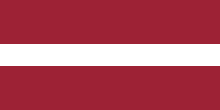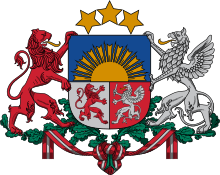Latvia
Jump to navigation
Jump to search

Latvia (Latvian: Latvija), officially the Republic of Latvia, is a country in the Baltic region of Northern Europe, one of the three Baltic states. It is bordered by Estonia to the north, Lithuania to the south, Russia to the east, and Belarus to the southeast, as well as a maritime border to the west alongside Sweden. Latvia has 2,070,371 inhabitants and a territory of 64,589 km2 (24,938 sq mi).
Quotes[edit]

- While separatist nationalisms developed and were increasingly expressed, there was no protracted attempt to use the extensive military resources of the Soviet state to prevent the collapse of the Soviet Union. Already, in 1986–7, the government had refused to employ force to support party leaders in the Baltic Republics. When the crisis rose to a height, counterreform attempts by the Soviet military, keen to preserve the integrity of the state, led to action against nationalists in Georgia (1989), Azerbaijan (1990), Lithuania (1991), Latvia (1991), and Moldova (1992). However, these steps were small-scale, and there was no significant violent supporting action by the 25 million Russians living within the Soviet Union but outside Russia, those, for example, who played a key role in crises in Crimea and eastern Ukraine in 2014. Gorbachev, the Sorcerer’s Apprentice of Marxism without there being, as in the story, any Sorcerer to restore order, had never sought the disruption he created.
- Jeremy Black, The Cold War: A Military History (2015)
- Article six of the Soviet constitution, which guaranteed the Communist Party a monopoly of power, was abolished in February 1990. However, the Party proved unable to compete effectively in the new political situation. Moreover, Gorbachev wanted to preserve the Soviet Union, if necessary only as a loose confederation. Thus, when the republics declared their independence, Gorbachev supported the attempt to maintain the authority of the Soviet Union by sending troops into them in January 1991. This policy led to clashes in Riga and Vilnius, the capitals of Latvia and Lithuania respectively. Fourteen unarmed people protecting the television tower in Vilnius were killed and five civilians in the seizure of the Interior Ministry in Riga. These steps did not intimidate the nationalists but led to the building of barricades in both cities. Iconic moments and locations were provided both for the nationalist movement and for post-independence memorialisation, notably in Vilnius.
- Jeremy Black, The Cold War: A Military History (2015)
- Latvia is monitoring Russia’s military activities near our national borders. The exercise in question which was launched today was planned in advance, and Latvia was notified about it.
- Raimonds Bergmanis (Latvian Defense Minister) has confirmed that the Russian military exercise in the Pskov Oblast near Russia's borders with Latvia and Estonia is a scheduled exercise, quoted on Baltic Times (15 February 2016), "Latvia aware of Russian military drills on border"
- Around the same time, communism in Central and Eastern Europe finally fell, but its economic rivalry with capitalism had, of course, long since been decided. It’s easy to think that these countries were never close to the market economies, but in 1950 countries such as the Soviet Union, Poland, Czechoslovakia and Hungary had a GDP per capita about a quarter higher than poor Western countries such as Spain, Portugal and Greece. In 1989, the eastern states were nowhere close. The eastern part of Germany was richer than West Germany before World War II. When the Berlin Wall fell on 9 November 1989, East Germany’s GDP per capita was not even half that of West Germany’s. Of these countries, those that liberalized the most have on average developed the fastest and established the strongest democracies. An analysis of twenty-six post-communist countries showed that a 10 per cent increase in economic freedom was associated with a 2.7 per cent faster annual growth. Political and economic institutions have improved the most in the Central and Eastern European countries that are now members of the EU, not least the Baltic countries, Estonia, Latvia and Lithuania. Today, they are some of the freest countries in the world and have more than tripled average incomes since independence. But one can also observe a recent reformer like Georgia. It was seen as an economic basket case, but after the Rose Revolution in 2003 it increased per capita incomes almost threefold and cut extreme poverty rates by almost two-thirds.
- Johan Norberg, The Capitalist Manifesto: Why the Global Free Market Will Save the World (2023)
- These days in Europe, many countries are sympathetic towards Ukraine and the situation here - of course, this touches a lot of people from different states. The fact that volunteers and government organizations work together on this and these kinds of humanitarian actions happen - is not unique, but it proves, that there are a lot of regular folks out there who care about Ukraine and its future.
- Juris Poikans (Latvia's Ambassador to Ukraine), quoted on UAToday (February 11, 2016), "Latvia sends more aid to Ukraine"
- Generally, the situation has worsened. We are now seeing signs of hybrid-warfare directed at us in Latvia.
- Janis Sarts, the director of the Latvia-based NATO Strategic Communications Center of Excellence, believes Russia’s form of hybrid-warfare can now be seen in Latvia, quoted on Baltic Times (February 17, 2016), "NATO STRATCOM: Hybrid-warfare already evident in Latvia"
- Will the shift of ministers from one ministry to another bring life to the government’s frail body [Latvia]? I doubt it.
- Inguna Sudraba, a member of an opposition party that declined to join Mr. Kucinskis’s coalition, predicted that the new government would be as fragile as its predecessor (referring to newly elected Prime Minister Maris Kucinskis), quoted on New York Times (12 February 2016), "Latvia Has a New Leader, as Fears of Russia and Migration Rise".
- We share similar values and attitudes about working hard and reaching out and so it is quite natural for Latvia to be taking steps to actively promote closer relations with strong, like-minded partners such as Korea. [He added] Korea is a very dynamic country, a genuine Asian tiger when we talk about economic growth. Latvia together with its two neighbours ― Estonia and Lithuania ― are referred to as the Baltic tiger
- Latvian Ambassador to South Korea, Peteris Vaivars, as quoted in Korea Times (February 14, 2016), "Latvia opens new chapter with Korea"
- In the Baltic states—Estonia, Latvia, and Lithuania—the return of the Red Army also provoked lasting resistance. Having become independent from Russia in 1918, the three countries were occupied by the Soviets in 1940, after Stalin’s pact with Hitler. The occupation was vicious, and the German invasion in 1941 had been greeted with relief by many Balts, who now turned their wrath on Russians and other local minorities, including Jews. The German defeat meant the return of the Red Army and the start of another round of bloodletting. In all three Baltic countries resistance coalesced around former officers, most of whom had collaborated with the Nazis; they were known collectively as the “Forest Brothers.” The fighting lasted for almost a decade and cost up to fifty thousand lives, mostly in Lithuania. Around 10 percent of the entire adult population of Balts was deported or sent to Soviet labor camps between 1940 and 1953.
- Odd Arne Westad, The Cold War: A World History (2017)
External links[edit]
Wikibooks has a book on the topic of




